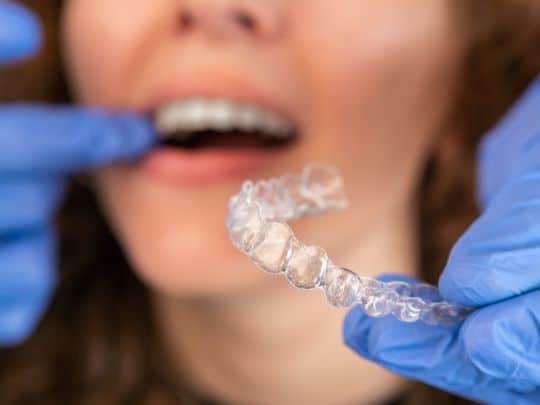Schedule Now
Invisalign and Gum Recession: What You Need to Know
If you’re considering getting Invisalign clear aligners to straighten your teeth, it’s essential to understand the potential risks and side effects associated with this popular orthodontic treatment. One of the concerns that patients often have is whether Invisalign can cause gum recession. More evidence suggests that Invisalign gum recession is a potential side effect that patients should be aware of before starting treatment. In this post, we’ll explain what gum recession is, how Invisalign can contribute to it, and how you can minimize your risk of experiencing it. So, let’s dive in and explore this important topic!
What Is Gum Recession?
Gum recession is a periodontal condition in which the gum tissue surrounding your teeth begins to pull back, exposing more of the tooth’s root. This can create gaps or pockets between the teeth and gums, making it easier for bacteria to build up and cause tooth decay or risk of gum disease. Gum recession can also make your teeth look longer than normal and create sensitivity to hot or cold temperatures.
Gum Recession Causes
Keeping your hygiene can be frustrating if you have gum damage. It is painful and discomforting, and you can’t show a straighter smile. There are plenty of factors that you may not know why you’re experiencing gum recession.
Aggressive Brushing
Using a hard-bristled toothbrush or aggressively brushing your teeth can cause gum tissue movement resulting in mild gum bleeding.
Gum Disease
Some symptoms of gum disease are caused by a bacterial infection that can damage the gum tissue and cause it to recede. Poor oral hygiene can cause bacteria to build up in the mouth.
Aging
As we age, our gums naturally recede, making us more exposed to gum disease.
Hormonal Changes
Changes in hormones during pregnancy, puberty, and menopause can result in more sensitive gum and susceptibility to recession.
Orthodontic Treatment
Some patients experience gum recession with braces. Aligner treatments or traditional braces can sometimes contribute to gum recession. In some cases, the movement of teeth during orthodontic treatment can cause the gum tissue to pull away from the teeth.
Genetics
Some patients may be more exposed to gum recession due to their genetic makeup.
Tobacco Use
Chemicals from using tobacco products can increase the risk of gum disease, leading to gum recession.
Bruxism
Grinding or clenching your teeth can pressure the gums and cause them to recede over time.
Misaligned Teeth
Teeth that are misaligned or crowded can put pressure on the gums, leading to recession.
Read Also: Gum Pain: Causes, Types, Prevention
Can Receding Gums Grow Back?
Unfortunately, once gums have receded, they do not grow back on their own. The gum tissue does not have the same regenerative capacity as other tissues in the body. That’s why preventing further gum recession is essential. Good oral hygiene practices like flossing and brushing regularly can help prevent the development of periodontal disease and further gum recession. Avoiding tobacco use and maintaining a healthy diet can also help to promote healthy gums.
Can Invisalign Worsen Gum Recession?
Invisalign uses clear aligner trays instead of traditional metal braces to slowly shift teeth into their desired position. While Invisalign can help to improve the appearance and function of your teeth, it can worsen gum recession if not correctly managed.
One way that Invisalign can lead to gum recession is if the aligners are not properly fitted. The aligners can cause the gums to recede if they are too tight or apply too much pressure to the teeth and gums. Additionally, if the aligners are not correctly cleaned and maintained, this can lead to bacterial buildup, bad breath, and gum disease, contributing to dental issues.
However, when Invisalign treatment is appropriately managed and monitored by a qualified orthodontist, it is unlikely to worsen gum recession. Invisalign can also help to improve gum health by properly aligning and fixing crowded teeth.
Can Invisalign Make Your Gums Bleed?
Invisalign can cause gum bleeding, which is generally not a common side effect. If the aligners are not properly fitted, they can put pressure on the gums and cause irritation or inflammation, leading to bleeding. Additionally, having pre-existing gum disease or poor dental hygiene can increase the risk of bleeding.
Must Read: What You Should Know About Gum Cleaning
Treatment for Gum Recession
Gum recession is the retraction of gum tissue surrounding and supporting your teeth, exposing the tooth’s root. This can lead to tooth sensitivity, decay, and, eventually, tooth loss.
Below are several treatments for gum disease.
Soft-Tissue Graft
Soft tissue graft or gum grafting is a surgical procedure in which tissue is taken from your gum or another mouth surface and placed over the affected area. This can help cover your teeth’ exposed roots and protect them from decay.
Chao Pinhole® Surgical Technique
This minimally invasive method involves making small holes in the gum tissue and gently manipulating it to cover the exposed tooth root. This technique can be less invasive than a gum graft and may have a faster recovery time.
Scaling and Root Planing
This non-surgical procedure involves removing tartar and plaque from the teeth and root surfaces. This can help remove bacteria that contribute to gum disease and promote gum tissue healing.
Laser Therapy
This newer treatment option uses a laser to remove bacteria and stimulate the growth of new gum tissue.
Related Article: Top 5 Benefits of Laser Gum Contouring You Need To Know
Good Oral Hygiene
Maintaining good oral hygiene routines, such as brushing at least twice a day, can help to prevent gum disease and makes the mouth healthy.
Quitting Smoking
Smoking can contribute to gum disease and worsen gum recession, so quitting smoking can help to improve gum health.
FAQs
Can wearing Invisalign cause gum recession?
When you wear Invisalign, your teeth are moved by the aligners. This means that the soft tissue of your mouth (gums) is pulled and stretched to accomplish this movement. Over time, this can cause gum recession, when the gums recede from your teeth.
Can wearing retainers cause gum recession?
Wearing retainers is not likely to cause gum recession directly. However, if retainers are not correctly fitted or maintained, they can contribute to gum recession indirectly.
For example, if a retainer is too tight or applies too much pressure to the teeth and gums, this can cause irritation and inflammation. Also, if a retainer is not properly cleaned and maintained, it can harbor bacteria and other harmful substances that can contribute to gum disease and recession.
How do I keep my gums healthy with Invisalign?
Keeping your gums healthy while wearing Invisalign is easy. Avoid using a toothbrush with large and hard bristles. Instead, use a soft-bristled toothbrush to clean your teeth. You should also avoid over-brushing your Invisalign trays and brackets, which can cause irritation.
Does Invisalign cause root damage?
The risk of root damage during Invisalign treatment is generally low, but it can occur if the aligners are not properly fitted or if too much pressure is applied to the teeth and roots. This can cause the roots to become compressed or distorted, leading to root resorption or other damage.
What are the disadvantages of Invisalign?
Below are potential disadvantages of using Invisalign
- Invisalign treatment can be more expensive than traditional braces.
- Requires self-discipline to wear them consistently for the recommended time each day.
- It may cause discomfort or soreness, particularly during the first few days of wearing them.
- It may not be suitable for all cases involving severe bite issues or tooth rotation.
- It requires good oral hygiene as it must be removed and cleaned regularly to prevent bacterial buildup.
- It may require attachments, which are small tooth-colored bumps bonded to the teeth to help the aligners grip the teeth more effectively.
Can Invisalign cause teeth to fall out?
No, Invisalign treatment does not cause teeth to fall out. Invisalign aligners are designed to gradually and safely shift teeth into their desired position without compromising the health or stability of the teeth.
What type of teeth can Invisalign not fix?
While Invisalign is a versatile orthodontic treatment, some types of teeth and bite issues may not be able to be corrected with Invisalign. These include:
- Severe bite issues
- Loose tooth for extractions
- Teeth that require significant rotation
- Large gaps between teeth
Treat Your Receding Gums With Smile Fort Wayne
Are you experiencing receding gums and looking for an effective treatment? Look no further than Smile Fort Wayne! Our experienced team of dentists in Fort Wayne, IN, can help you restore your gum health and prevent further damage.
With our advanced techniques and personalized approach, we can create a personalized treatment plan for your specific needs and goals. We offer a range of treatments for gum recession, including gum grafting, scaling and root planing, and laser therapy.
Don’t let receding gums compromise your oral health and smile. Contact Smile Fort Wayne today to schedule a consultation toward restoring your gum health.





